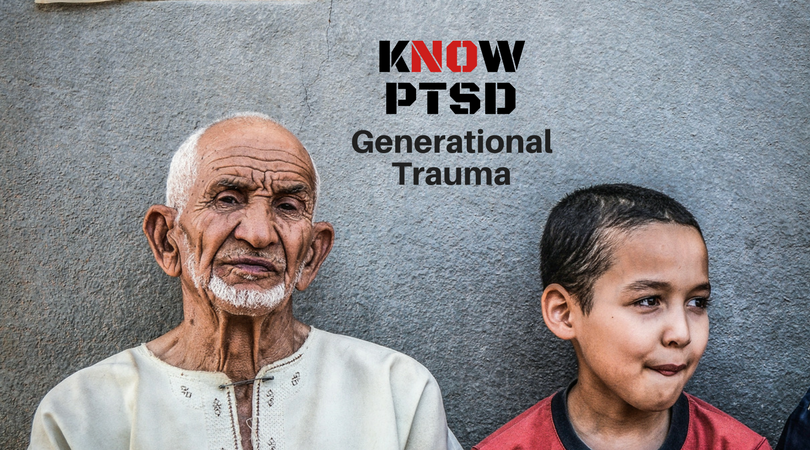
Is the idea that you can be struggling with the impact of trauma that happened to your parents, grand-parents, or even ancestors. The grand-children of WW2 concentration camp survivors are at higher risk of mental health difficulties than the general public. The parents of children who are sexually assaulted are likely to have their own sexual assault history. Adult children of alcoholics can replicate the disfunction of their childhood home life in their adult family life, even when they never have their own alcohol addiction issues. So, why is it that individuals with parents or ancestors with unresolved trauma are at greater risk?
Possible Reasons for Greater Risk
- Exposure to symptoms: Growing up with a parent who is struggling with PTSD or unresolved trauma means that we are exposed to that person’s response to and management of their trauma/PTSD. Short temper, depression, anxiety, the use of drugs or alcohol and many more.
- Poor modeling: If a parent is struggling to manage their own issues it can be because they lack the tools or skills to be more successful. If they lack the skills themselves, they can’t pass them onto their children.
- Poor Emotional Connection: Parents who are overwhelmed by their own experiences may not have the emotional capacity to build a solid connection with their child. The lack of secure emotional bond between a child and caregiver can have a lifelong impact on that child.
- Economic circumstances: Unresolved trauma can make it difficult to hold down steady, well paid, employment. This increases the likelihood that the child will grow up in financially challenging circumstances, which brings its own additional challenges.
- Increased Risk: Unresolved trauma can be suppressed, denied or dissociated from. As we grow up we use our experiences to inform the decisions we make. To do that, we must integrate our experiences into a greater understanding of the world. Unresolved trauma is not integrated and thus often isn’t used to help inform the adult about risks and dangers. Unfortunately, this can mean that parents with unresolved trauma can be less able to know when or how to keep their own children safe.
Growing up in a home with a parent with trauma or a generational trauma impact can have a number of ongoing effects once that child grows up. Growing up in a home with unresolved trauma can become a negative cycle that just keeps repeating. Parents didn’t have the skills to deal with their difficult emotions and upsetting experiences. They can’t teach the child. The child becomes an adult who doesn’t know how to deal with their own challenging situations. Similarly, poor emotional bonding with the parent can translate into an adult who struggles to build a healthy emotional bond with their partner and children. Parents who fail to protect their children can lead to children experiencing their own traumas which may then go unresolved and can lead to an adult who doesn’t know how to keep their own child safe…
But not every child who grows up in a home where a parent is struggling with unresolved trauma gets stuck in this cycle. Many children grow up in such homes and go on to live healthy stable lives, what helps them achieve this? For some it’s the presence of a second parent who helps create a healthy supportive environment for that child to grow up in. For others it’s a relative or community member who steps up and helps that child step out of the cycle. Still others grow up and decide that they want to heal and grow so that they can end the impact of generational trauma. Even if a person didn’t manage to escape their childhood without absorbing some generational trauma, it is possible to heal and break the cycle of generational trauma. Here are four tips for healing your generational trauma.
Reduce the impact of the generational trauma
- Own it: Stop pretending or trying to convince yourself it wasn’t that bad. We can’t heal what we won’t own. Admit to yourself that your childhood was difficult, and it didn’t prepare you to have healthy relationships or be a good parent yourself.
- Open to alternatives: Many of us parent the way that we do because it was how we were parented. “I turned out alright” may not be the best way to choose your parenting style. You might have turned out alright despite how you were raised, not because of it.
- Seek skills: Read a book on healthy relationships or parenting, take a class, join a parents group. I suggest learning about several styles or theories on relationships or parenting. Then you can figure out which parts work best for you.
- Heal your own traumas: If your childhood left unhealed scars on your soul it can be very beneficial to do your own healing work. I believe there is no better way to put our past behind us, then to heal it. If our past is knocking on our present, then it needs something and probably won’t go away until we resolve it. Find a counselor or therapist who is skilled in working to heal childhood trauma that you feel listens and cares.
Being the child or grand-child of adults with unresolved trauma isn’t a guarantee that your life will be a struggle, but it does mean you are more likely to struggle in your relationships and life. The generational trauma that has been passed down does not have to keep being passed down. You can choose to carve a new path and heal from your childhood.
Thank you for always being open and honest with your readers It’s refreshing to see a blogger who is unafraid to be vulnerable and real